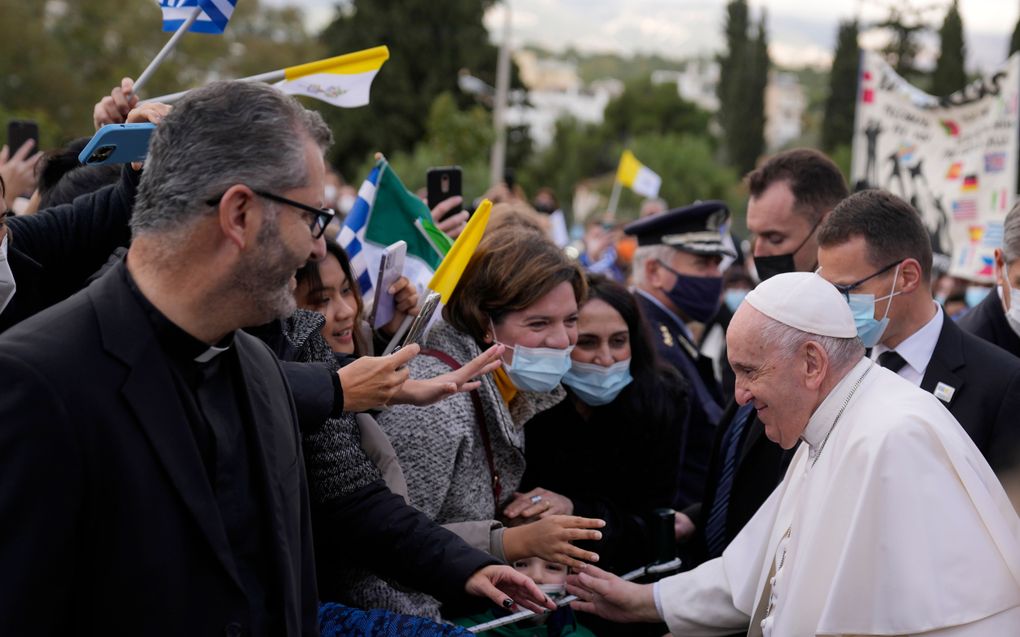Pope Francis apologises in Greece to Orthodox
06-12-2021
Southern Europe
CNE.news

Pope Francis visits Saint Dionysius School of the Ursuline Sisters in Athens, Greece on Monday. The visit of the Pope will boost relations between the Orthodox and the Catholic Church, as well as relations between the two countries, Greece and the Vatican. Photo EPA, Thanassis Stavrakis
Southern Europe
During his visit to Greece, Pope Francis apologised to God and the Orthodox Church family for the mistakes made by Catholics. He stated that these difficulties had nothing to do with the teachings of Jesus Vatican News reports.
"I admit with shame, with the Catholic Church, that actions and decisions that have little or nothing in common with Jesus and the Gospel, dictated primarily by the desire for profit and power, have weakened communication. Thus, we allowed fruitfulness to be compromised by divisions. History has its weight, and today here I feel the need to again ask for forgiveness from God and the brothers for the mistakes committed by many Catholics, the Pope said on Saturday in Greece.
On Saturday morning, the pontiff, who had landed in the Greek capital from Cyprus, mentioned the roots that unite Catholics and Orthodox and the later differences. Pope Francis had begun a five-day visit to Cyprus and Greece on Thursday.
Incident
Earlier, there had been an incident during Francis' arrival at the seat of the Orthodox Archbishop of Athens, Hieronymos II. An elderly Orthodox priest loudly insulted the Pope as a "heretic", a false teacher. Security forces immediately took the clergyman away, German website katholisch.de writes.
Afterwards, the Pope met with representatives of the Catholic minority in Greece. "See your smallness as a blessing and accept it gladly. It enables you to trust in God and God alone," Francis said.
Great Schism
In 2001, Pope John Paul II also took a knee during his visit to Greece. He apologised for the atrocities committed by Catholics against the Orthodox, especially the destruction of Constantinople by the Crusaders.
The Great Schism of the year 1054 is the crucial moment for the division of Christendom into a (Western) Roman Catholic and an (Eastern) Orthodox Church. At that time, the Pope's Roman envoy excommunicated the Patriarch of Constantinople. Patriarch Kerullarios then had the envoy condemned by a synod. The mutual ex-communications were not officially lifted until 1965.
Refugees
The Pope also criticised what he called democracy scepticism in Greece on Saturday. Instead of following populists and authoritarian leaders, he recommended the former Italian Prime Minister Alcide De Gasperi (1881-1954), a promoter of European unification, as a role model.
Especially in refugee policy, the EU is currently not presenting a good picture, Francis said. It is torn apart by "nationalistic egoism" and sometimes acts in a "blocked and uncoordinated manner". Europe must become a "driving force of solidarity", develop a comprehensive view of migration and pay more attention to those in need. Francis expressly praised Greece's "willingness to receive" migrants, even though the number of migrants exceeds the population of individual towns on some islands.
During his visit to Cyprus, Francis also set an example there on the issue of refugees. In the coming weeks, he wants to fly 50 migrants to Rome. According to Cypriot Interior Minister Nicos Nouris, the first 14 asylum seekers will pass to the Vatican on 16 December.
Meeting with Russian Patriarch
In October, Metropolitan Hilarion of Volokolamsk announced preparations for a meeting between Patriarch Kirill of Moscow and All Russia and Pope Francis, Russian Radio Sputnik reports.
According to the hierarch of the Russian Orthodox Church, the exact date will be announced shortly before the meeting of the primates of the two churches.


